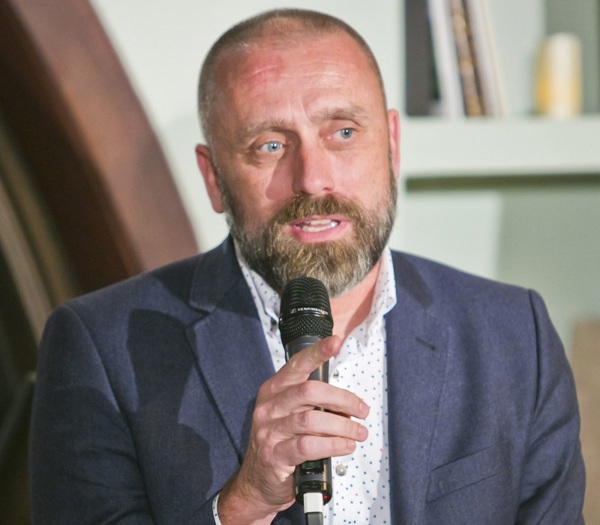A former Paralympian and dad-of-2 is now free of throat cancer after receiving cutting-edge radiotherapy at The Christie NHS Foundation Trust in Manchester, as part of a pioneering clinical trial.
Marc Woods, who is 54 and lives near Nottingham, has had a life that has been shaped by cancer. He was diagnosed with bone cancer as a teenager and had to have his left leg amputated as part of his treatment. He went on to become a multiple medal-winning Paralympic swimmer and is now a speaker/coach.
It was while rehearsing a speech for a client that Marc felt like he had something stuck in his throat. He went to get it checked out and was told it was throat cancer.
“Although I knew something was wrong, being diagnosed with cancer for a second time still came as a surprise,” comments Marc. “I had all sorts of questions going through my head, it was a really difficult time for my family.”
His team in Nottingham referred him to The Christie where he was treated with proton beam therapy as part of the TORPEdO clinical trial. TORPEdO is co-led by The Christie and The Institute of Cancer Research, London. It’s funded by Cancer Research UK and the NHS, with support from The Taylor Family Foundation. Proton beam therapy is administered at The Christie NHS Foundation Trust in Manchester and at University College London Hospitals NHS Foundation Trust.
The trial will determine whether the use of proton beam therapy reduces long-term side effects and improves the quality of life for patients treated with radiotherapy for throat cancer. The trial has now completed recruitment of the full cohort of 201 patients, 3 months ahead of target. *
Proton beam therapy is a newer form of radiotherapy. It targets the tumour using high-energy protons which are shaped into a beam. Unlike standard radiotherapy, the beam doesn’t release a large amount of energy until it gets to the tumour. This results in less radiation dose to surrounding normal tissues, with potentially less damage to the healthy tissues as well.
Proton beam therapy is only suitable for the routine treatment of a small number of people with certain cancer types, such as in cases where the tumour is close to critical structures like the brain or spinal cord.
Marc had 33 daily sessions of the treatment at The Christie. He stayed in Manchester during his treatment, returning home for only two days – his son’s birthday and Christmas Day. He finished his treatment in January of this year and is now showing no evidence of disease.

“I was so lucky to be able to have such a new form of treatment for my second cancer experience – things have moved on so much since I got diagnosed with my first cancer back in 1986.
